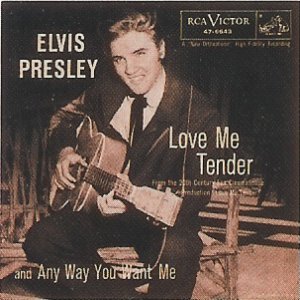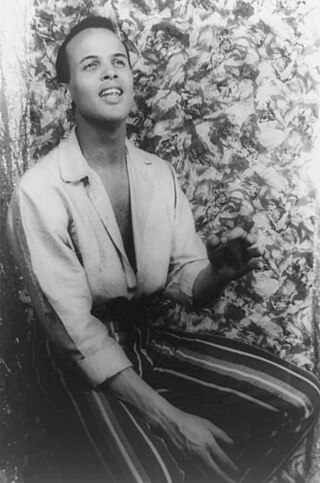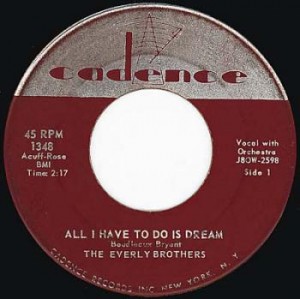Related Research Articles
"Blue Moon" is a popular song written by Richard Rodgers and Lorenz Hart in 1934 that has become a standard ballad. Early recordings included those by Connee Boswell and by Al Bowlly in 1935. The song was a hit twice in 1949, with successful recordings in the U.S. by Billy Eckstine and Mel Tormé.

"Strangers in the Night" is a song composed by Bert Kaempfert with English lyrics by Charles Singleton and Eddie Snyder. Kaempfert originally used it under the title "Beddy Bye" as part of the instrumental score for the movie A Man Could Get Killed. The song was made famous in 1966 by Frank Sinatra.

"The Wayward Wind" is a country song written by Stanley Lebowsky (music) and Herb Newman (lyrics), and first recorded by American singer Gogi Grant in 1955, and released in 1956. Grant's version reached No. 1 on both the Cash Box charts, where it remained at No. 1 for five weeks, and the Billboard charts, remaining at No. 1 for six weeks, ending Elvis Presley's seven-week run at No. 1 with "Heartbreak Hotel". It remained in the top 10 for fifteen weeks, and was ranked as the No. 5 song for 1956 according to Billboard. It became a Gold record. Members of the Western Writers of America chose the song as one of the Top 100 Western songs of all time.

"Nel blu, dipinto di blu", popularly known as "Volare", is a song originally recorded by Italian singer-songwriter Domenico Modugno. Written by Modugno and Franco Migliacci, it was released as a single on 1 February 1958.

"Love Me Tender" is a 1956 ballad song recorded by Elvis Presley and published by "Elvis Presley Music" from the 20th Century Fox film of the same name. Lyrics are credited to "Vera Matson". The melody is identical to the sentimental Civil War ballad "Aura Lea" and therefore credited to Aura Lea's composer, the Englishman George R. Poulton. The RCA Victor recording by Elvis Presley was No. 1 on both the Billboard and Cashbox charts in 1956.
"It's Almost Tomorrow" is a 1955 popular song with music by Gene Adkinson and lyrics by Wade Buff. The song was actually written in 1953, when Adkinson and Buff were in high school. Hit versions were released in 1955 by The Dream Weavers, Jo Stafford, David Carroll, and Snooky Lanson.
"Memories Are Made of This" is a popular song about nostalgia, written in 1955 by Terry Gilkyson, Richard Dehr, and Frank Miller. They were the members of a three-pieced group called "The Easy Riders", who served as a backing band for Dean Martin's version of this song, also released in 1955.
"My Happiness" is a pop music standard which was initially made famous in the mid-twentieth century. An unpublished version of the melody with different lyrics was written by Borney Bergantine in 1933.

"Day-O " is a traditional Jamaican folk song. The song has mento influences, but it is commonly classified as an example of the better known calypso music.
"On the Street Where You Live" is a song with music by Frederick Loewe and lyrics by Alan Jay Lerner from the 1956 Broadway musical My Fair Lady. It is sung in the musical by the character Freddy Eynsford-Hill, who was portrayed by John Michael King in the original production. In the 1964 film version, it was sung by Bill Shirley, dubbing for actor Jeremy Brett.

"Who's Sorry Now?" is a popular song with music written by Ted Snyder and lyrics by Bert Kalmar and Harry Ruby. It was published in 1923, when Isham Jones had a major hit with it. Other popular versions in 1923 were by Marion Harris, Original Memphis Five, Lewis James, and Irving Kaufman.
Charles Randolph Grean was an American producer and composer.
"Dream a Little Dream of Me" is a 1931 song with music by Fabian Andre and Wilbur Schwandt and lyrics by Gus Kahn. It was first recorded in February 1931 by Ozzie Nelson and His Orchestra, soon followed by Wayne King and His Orchestra with vocals by Ernie Birchill. A popular standard, it has seen well over 400 recorded versions.

"All I Have to Do Is Dream" is a song made famous by the Everly Brothers, written by Boudleaux Bryant of the husband-and-wife songwriting team Felice and Boudleaux Bryant, and published in 1958. The song is ranked No. 141 on the Rolling Stone magazine's list of The 500 Greatest Songs of All Time. The song is in AABA form.
"It's All in the Game" is a pop song whose most successful version was recorded by Tommy Edwards in 1958. Carl Sigman composed the lyrics in 1951 to a wordless 1911 composition titled "Melody in A Major", written by Charles G. Dawes, who was later Vice President of the United States under Calvin Coolidge. It is the only No. 1 single in the U.S. to have been co-written by a U.S. Vice President or a Nobel Peace Prize laureate.
"Sweet Dreams" or "Sweet Dreams (of You)" is a country ballad, which was written by Don Gibson. Gibson originally recorded the song in 1955; his version hit the top ten of Billboard's country chart, but was eclipsed by the success of a competing version by Faron Young. In 1960, after Gibson had established himself as a country music superstar, he released a new version as a single. This version also charted in the top ten on the country chart and also crossed over to the Billboard Hot 100, where it peaked at number ninety-three. The song has become a country standard, with other notable versions by Patsy Cline and Emmylou Harris.
"One Night" is a song written by Dave Bartholomew, Pearl King, and Anita Steiman. It originally was an R&B hit for Smiley Lewis in 1956, before being recorded with greater commercial success by Elvis Presley in 1958.
Lucky Lips is a song written by Jerry Leiber and Mike Stoller. It was originally recorded by Ruth Brown in 1956 and was successfully covered by Cliff Richard in 1963.

"I Love How You Love Me" is a song written by Barry Mann and Larry Kolber. It was a 1961 Top Five hit for the pop girl group The Paris Sisters, which inaugurated a string of elaborately produced classic hits by Phil Spector. Bobby Vinton had a Top Ten hit in 1968 with a cover version. The song has been recorded by many other artists over the years.

The singles discography of Elvis Presley began in 1954 with the release of his first commercial single, "That's All Right". Following his regional success with Sun Records, Presley was signed to RCA Victor on November 20, 1955. Presley's first single with RCA, "Heartbreak Hotel", was a worldwide hit, reaching the No. 1 position in four countries and the top 10 in many other countries. Other hit singles from the 1950s include "Don't Be Cruel", "Hound Dog", "Love Me Tender", "Too Much", "All Shook Up", "(Let Me Be Your) Teddy Bear", "Jailhouse Rock", "Don't", "Hard Headed Woman" and "A Big Hunk o' Love". On March 24, 1958, Presley entered the United States Army at Memphis, Tennessee, and was stationed in Germany. He left active duty on March 5, 1960.
References
- ↑ Whitburn, Joel (2000-11-01). The Billboard Book of Top 40 Hits (7th Rev. ed.). New York: Watson-Guptill Publications. ISBN 978-0-8230-7690-1.
- ↑ Roberts, David (2005). British Hit Singles & Albums (18th ed.). London: Guinness World Records. p. 60. ISBN 1-904994-00-8.
- ↑ "Summary of the court case". columbia.edu.